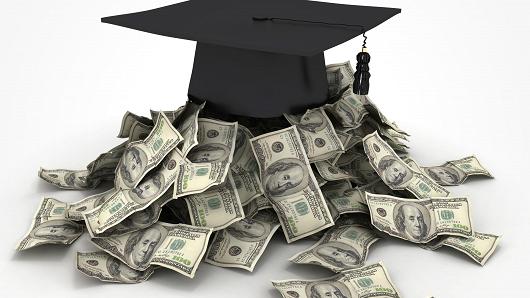Student Loans. Cue the ominous music. Cue the stress and the worry. Just the very mention of those two simple words can send shudders down the spine of anyone who has ever taken a student loan out. But nowadays, most people attending college have to take on student loans. They have high hopes of earning a college degree, obtaining a high paying job, and being able to pay off the loan and be debt free in no time. Even if you don’t find the job you originally anticipated, repayment obligations usually begin 6 to 9 months after leaving school. If you can’t find work, the payments are probably more than you can handle and filing for bankruptcy might not make the debt go away.

Student Loans in Bankruptcy
Student loans are usually non-dischargeable in bankruptcy. This means that even after your bankruptcy erases all your other debts, the student loan debt still remains. If you fall 9 months behind, your lender can call the whole loan due at once. Filing bankruptcy can only be a viable option in one circumstance.
Discharge of Student Loans in Bankruptcy
The law lets you eliminate your student loans if paying them creates an “undue hardship” for you and your family. You must prove to bankruptcy court that you’re only earning enough to pay for a “minimal standard of living” What this means is that you can’t afford cable, internet, or a cell phone—even without paying your student loans. You also have to prove that your finances aren’t likely to improve anytime soon. It helps if you were able to make at least a few payments because this shows the court that you legitimately tried.
File Adversary Proceeding to Discharge Student Loans
A hardship discharge won’t happen automatically when you file for bankruptcy. You—or your attorney—must file an extra petition, which is called an adversary proceeding. The petition asks the court to make an exception in your case from the usual rule that student loans cannot be erased.
Chapter 13 Bankruptcy and Student Loans
When you decide to file for Chapter 13 bankruptcy instead of Chapter 7, you agree to pay off your debts over 3 to 5 years. The court supervises your payments and your student loan lenders can’t demand the whole loan at once. Each month, you give your bankruptcy trustee all your extra income and the trustee divides that money among all of your creditors. This can make your overall monthly payments go down over time.
Even though you’ll still have your student loan payments after your Chapter 13 plan ends, your bankruptcy will erase your other debts. You’ll only have to deal with your student loan payments if they haven’t been paid off by that time.
Bankruptcy and student loans are two complicated concepts and the laws connecting the two can be complicated. It is recommended that you contact a personal bankruptcy lawyer to help navigate you through this tricky situation. The experienced Phoenix bankruptcy attorneys are ready and willing to help today! Contact us and set up your free consultation so we can show you how we can help!

